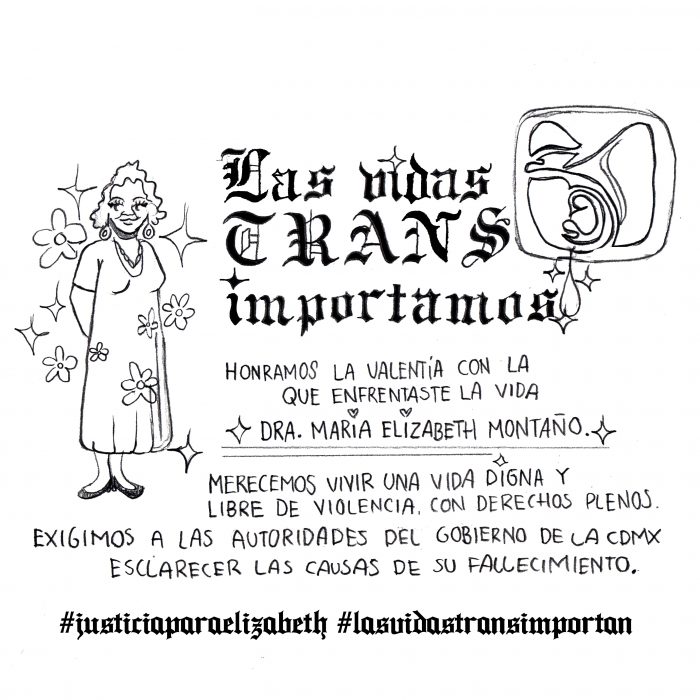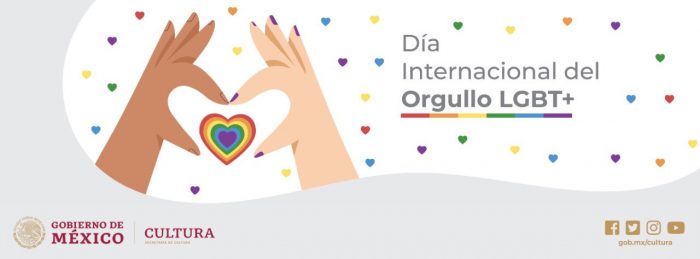
28.06.2020
The series of opinions on the cultural policies of the government of Mexico regarding a public cultural system in crisis continues, for which Juan Carlos Buenrostro García reflects on the interdependence between culture and education little recognized by the government when it comes to public policies that guarantee the dignified life of the people who make up the LGBTTIAQ community.

Blind Faith: Brief Overview On Pride and The Arrival of The Parental Pin
In mid-2019, I had the opportunity to interview Lori Lu, a drag queen from Nuevo León. At that time, we talked about the arrival of bio queens, women who drag, to the transvestite scene in the north of the country; at the same time, we also talked about a project she was leading: The Drag Story Hour. This initiative is a replica of an American program where drag queens read stories to children, in order to promote a safe, respectful, and diverse environment for infants and their parents. Such activities complexify heteronormativity as an axis of cultural habits.
However, this replica around the drag project was short-lived. Soon after their first activities, the program was accused of corruption of minors by the conservative faction of the state. With the excuse that they were exposing a group of children to “gender ideology,” leading them to self-definition and presenting them with the alternative of changing their sex. Related to this, in 2020, a similar discussion began to generate popularity. In Nuevo León there was talk of reforms to the State Education Law, the so-called parental pin, a resource originating from the Spanish alt-right in which parental figures have the possibility of “blocking,” at all levels of compulsory education, certain classes on morals, values, and sexuality, deciding whether or not their child will take them.
Both events are not isolated cases. On the contrary, they are evidence of the effort of LGBT hating sections to control, censor, and make invisible those cultural practices, especially the ones related to education, that come from diverse approaches. In the case of the parental pin, issues of gender, sexual orientation, and identity, as well as the teaching of contraceptive methods, can be prohibited. What is so frightening about exposing young people to secular and scientific information? What’s so ominous of a transvestite reading stories to children for it to be called “corruption of minors”? Where does the possibility of an anti-heteropatiarchal education fit?
This law initiative, as well as the denunciation to cease the realization of The Drag Story Hour, were no resolved in Nuevo León. Unfortunately, the issue with the parental pin didn’t end there. On May 21 of this year, Aguascalientes voted on changes to the Aguascalientes Education Law, which were approved and published four days later. In the land of warm waters, the parental pin was accepted, along with its chiaroscuros. Classes will not be stopped and the material selected for them will not be directly censored. This means that we are now in a paradoxical situation. Will the parents who accept that their children receive this training demand that the State teach quality content?

We must not avert our eyes from the danger of changes to this law. There has been talk of the unconstitutionality of the initiative. In Aguascalientes, several activists and civil societies have spoken out and collaborated together to address this issue. Morras Help Morras, the Feminist Community, Cultivando Género, and the Ser Gay collective have all taken action on the issue.
“We are now working on a document to repeal that law. The issue is that we only have 30 days to generate a very specific, very technical, non-subjective document and present it to the SCJN to make the pertinent changes,” Manuel Gutiérrez Flores, activist and main spokesperson for the Ser Gay collective, told me in an interview on Saturday, June 13.
“It is unconstitutional due to a number of contradictions. It violates the right to education, the right to self-determination, among many other things”, Manuel explains to me about this reform. In view of the arrival of the parental pin, it only makes our shortcomings in terms of education more evident. What sex education are you going to reform? Was there any sex education in Mexico to begin with?
Not talking about these issues will not make the young people of the LGBTTIAQ community disappear, but it will make their acceptance process more difficult, without safe accompaniments for their identities they will be even more violated. It should not be forgotten that the family in which we trust is often an aggressive space for the LGBTTIAQ community. However, there is a blind faith in the misnamed “natural family”, a discourse that is reinforced through the advocacies of the conservative elites who influence public life.
Let’s keep in mind that the arrival of the parental pin occurred five days before the Pride Month. Which is a very serious situation. June has been a complex month, both locally, I am writing from Aguascalientes, and nationally. On the same day that the president was unaware of the CONAPRED, the regrettable death of Dr. María Elizabeth Montaño, a trans woman, IMSS worker, and activist, was made public. To date, the motives and circumstances of her death remain unclear.[1] We ask for justice, she is no longer with us.
At the same time of these terrible circumstances, as they prepare a series of virtual activities to commemorate Pride Day, the Secretaría de Cultura [Ministry of Culture] reminisces the ten years of the death of Carlos Monsiváis as well as promotes the photographic and documentary project of Eduardo Luzuriaga, emphasizing his relation with sexual dissidence. What then is the role of the Secretaría de Cultura in terms of a social reality that perpetuates violence towards the LGBTTIAQ community? How can we talk about the exercise of cultural rights in Mexico if, on the one hand, the problem of aggression against sexual dissidents is present on a daily basis;[2] and on the other hand, there are educational reforms against the consideration of non-heteronormal sexualities? Does the design of public policies recognize the interdependence between the Secretarías [Ministries] as a central point of their conception? What are the specific and permanent cultural policies in the face of these circumstances beyond Pride Day?

To be also considered: the shortage of retroviral is still present,[3] trans* children and home parental families[4] are still not recognized in many states of the country, beyond the capital. Manuel Gutierrez also clarified in the interview that there is not even a shelter for people of sexual diversity in Aguascalientes. Siobhan Guerrero, a few days ago in her weekly video blog, spoke about the critical situation that NGOs dedicated to the LGBTTIAQ population are going through.[5] This means that the initiatives of groups and civic associations have become even more unsafe due to the pandemic. Is there room for us? Will there be space for us to exist in peace?
This is a reminder of all the battles that remain in our history yet to win, a daunting scenario for Mexico. But was the State, even before the arrival of the parental pin, interested in providing the members of the sexual diversity with the right psychological and educational tools to defend their dignity and their right to self-determination through cultural expressions? Everything seems to be a mirage of democratic inclusion.
The State, in its multiple activities, before considering censoring the will for the protection of minorities, should begin developing public policies of reparation that provide resources and give agency to cultural practices for their materialization, but that also allows the continuous development and protection of its agents, beyond the capital territory, considering an action mainstreaming that pays heed to factors such as skin color, gender, sex, the socioeconomic question, and the state.[6]
On our part, the sexual dissidence should continue to strive to strengthen methodologies for a more hopeful anti-normative future.[7] This hope has to focus on the powers that lie in that which unites us, differentiates us, and violates us. To look for the place where each of our identities is seen with the means for and by personal and community fulfillment. How do you reach something that seems so disparate? How can we organize ourselves without making the same mistakes as before? How can we achieve a non-centralized LGBTTIAQ community? Rather than give affirmations in this short paper, I wanted to raise questions that are currently necessary. The questions remain open and will be answered only in time.
Navarrete, S. JusticiaParaElizabeth: ciudadanos exigen aclarar muerte de doctora y activista, https://politica.expansion.mx/cdmx/2020/06/19/justiciaparaelizabeth-ciudadanos-exigen-aclarar-muerte-de-doctora-y-activista. (Consultado el 23 de junio del 2020)
Redacción Infobae, Violencia en México: asesinaron a 117 integrantes de la comunidad LGBT en 2019. https://www.infobae.com/america/mexico/2020/05/15/violencia-en-mexico-asesinaron-a-117-integrantes-de-la-comunidad-lgbt-en-2019/. (Consultado el 23 de junio del 2020)
Bruciaga, W. La crisis de los antirretrovirales en México, Revista de Universidad de México (2020), p. 128.
Xantomila, J. En 12 estados aún no legalizan matrimonio igualitario ni identidad de género. https://www.jornada.com.mx/ultimas/sociedad/2020/05/20/en-12-estados-aun-no-legalizan-matrimonio-igualitario-ni-identidad-de-genero-3491.html (Consultado el 23 de junio del 2020)
Guerrero, S. En el mes del Orgullo toca pensar cuál es nuestra agenda, https://www.youtube.com/watch?v=BMn1wftmdfU (Consultado el 15 junio del 2020) y En el mes del Orgullo toca pensar cuál es nuestra agenda, https://www.youtube.com/watch?v=BMn1wftmdfU (Consultado el 15 junio del 2020).
País, M. La transversalización del enfoque de géneros en las políticas culturales públicas: el caso del Ministerio de Cultura argentino, Revista Temas y Debates 33(2018), p. 161-180.
Esteban, J. Utopía Queer, (Buenos Aires: Caja Negra, 2009), 32.
Comments
There are no coments available.